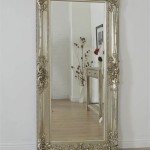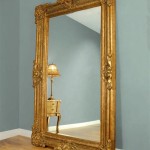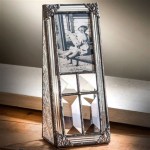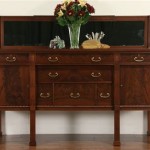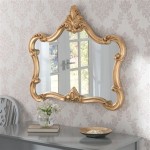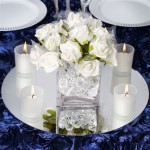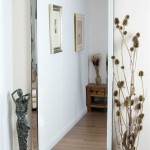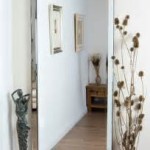Reflecting Elegance: A Guide to Vintage Victorian Style Mirrors
Victorian-era design, spanning the reign of Queen Victoria from 1837 to 1901, remains a popular source of inspiration in interior design today. Among the coveted antique pieces from this period, Victorian style mirrors hold a special place, prized for their intricate craftsmanship and ability to infuse a space with a touch of historical grandeur. This article explores the defining characteristics of vintage Victorian style mirrors, offering insights into their history, styles, and what to consider when incorporating them into modern interiors.
Key Features of Victorian Style Mirrors
Victorian style mirrors are recognizable for their distinctive features, reflecting the opulence and attention to detail characteristic of the era:
- Ornate Frames: Elaborate frames are a hallmark of Victorian mirrors. These frames often feature intricate carvings, decorative moldings, and embellishments such as flowers, leaves, scrolls, and cherubs.
- High-Quality Materials: Authentic Victorian mirrors were typically crafted from high-quality materials, including wood, gilded gesso, and sometimes even silver or ivory.
- Beveled Edges: The mirror glass itself often features beveled edges, adding depth and a touch of sparkle to the piece.
Popular Victorian Mirror Styles
The Victorian era encompassed several distinct design movements, each influencing the style of mirrors produced during that time:
- Gothic Revival: Drawing inspiration from medieval architecture, Gothic Revival mirrors feature pointed arches, trefoil motifs, and intricate tracery.
- Rococo Revival: Known for its lighthearted and asymmetrical designs, Rococo Revival mirrors showcase ornate carvings, C-scrolls, and shell motifs.
- Aesthetic Movement: Emphasizing artistic beauty and simplicity, Aesthetic Movement mirrors often incorporate elements of nature, such as flowers, birds, and butterflies, into their designs.
- Arts & Crafts: Focusing on handcrafted quality and simple forms, Arts & Crafts mirrors often feature linear designs and stylized floral motifs.
Identifying Authentic Victorian Mirrors
Distinguishing authentic vintage Victorian mirrors from reproductions requires careful observation and attention to detail. Authentic mirrors often exhibit signs of age and wear, adding to their character and value.
- Patina and Wear: Look for signs of age, such as slight discoloration of the frame or minor imperfections in the glass. These characteristics can indicate authenticity.
- Construction Techniques: Examine the back of the mirror for clues about its construction. Hand-carved details and traditional joinery methods are indicative of older pieces.
- Maker's Marks: Some antique Victorian mirrors may bear the maker's mark or label, which can help verify their authenticity and age.
Incorporating Victorian Mirrors into Modern Interiors
Victorian style mirrors can add a touch of timeless elegance and historical charm to various interior styles.
- Creating a Focal Point: A large Victorian mirror can serve as a stunning focal point in a living room, dining room, or entryway. Its ornate frame will draw the eye and create a sense of grandeur.
- Enhancing Natural Light: Placing a Victorian mirror opposite a window can help reflect natural light deeper into the room, making the space feel brighter and more spacious.
- Adding Depth and Dimension: Mirrors can create an illusion of depth and dimension, particularly in smaller spaces. A strategically placed Victorian mirror can visually expand a hallway or a compact room.
Caring for Victorian Mirrors
Proper care and maintenance are crucial for preserving the beauty and value of vintage Victorian style mirrors.
- Cleaning the Frame: Dust the frame regularly with a soft, dry cloth. Avoid using harsh chemicals or abrasive cleaners, which can damage the finish. For more thorough cleaning, consult a professional restorer.
- Cleaning the Mirror Glass: Clean the mirror glass with a gentle glass cleaner and a soft cloth. Avoid spraying the cleaner directly onto the mirror, as it could seep behind the glass and damage the backing.
- Handling and Storage: Handle antique mirrors with care, supporting the frame and avoiding pressure on the glass. If storing a mirror, protect it with a soft covering and store it in a dry, stable environment.
Evaluating the Value
Several factors contribute to the value of a vintage Victorian style mirror.
- Rarity: Mirrors from less common Victorian styles or those produced by renowned makers tend to be more valuable.
- Condition: The overall condition of the mirror, including the frame and the glass, significantly impacts its value. Mirrors in excellent original condition are generally more desirable.
- Size and Scale: Larger, more impressive Victorian mirrors typically command higher prices than smaller ones.
- Provenance: A documented history of ownership can add to the value and historical significance of an antique mirror.
Victorian style mirrors offer a captivating glimpse into the artistry and craftsmanship of a bygone era. Incorporating one into a modern interior can add a touch of historical elegance and create a focal point that sparks conversation and admiration.

Mirror In Golden Frame Vintage Style Richly Decorated Victorian Wall Decor

Vintage Ornate Mirror Made In Italy Sy Plastic Type Material Victorian Style New Zealand

Victorian Mantle Mirror In Gilt Roccoco Carved Frame For At Pamono

The History Of Mirror And Its Evolving Style Through Ages

Mirror In Gold And White Frame Vintage Style Richly Decorated Victorian Wall Decor

Vintage Style Decorative Vanity Mirror In Antique Gold

Mirror In Gold And White Frame Vintage Style Richly Decorated Victorian Wall Decor

Wall Mirror Accent Resin Rectangular Vintage Victorian Style Framed 17x11

Carved And Distressed Rococo Style Mirror For At Pamono

Victorian Style Cast Iron Stand Up Swivel Mirror Ruby Lane

